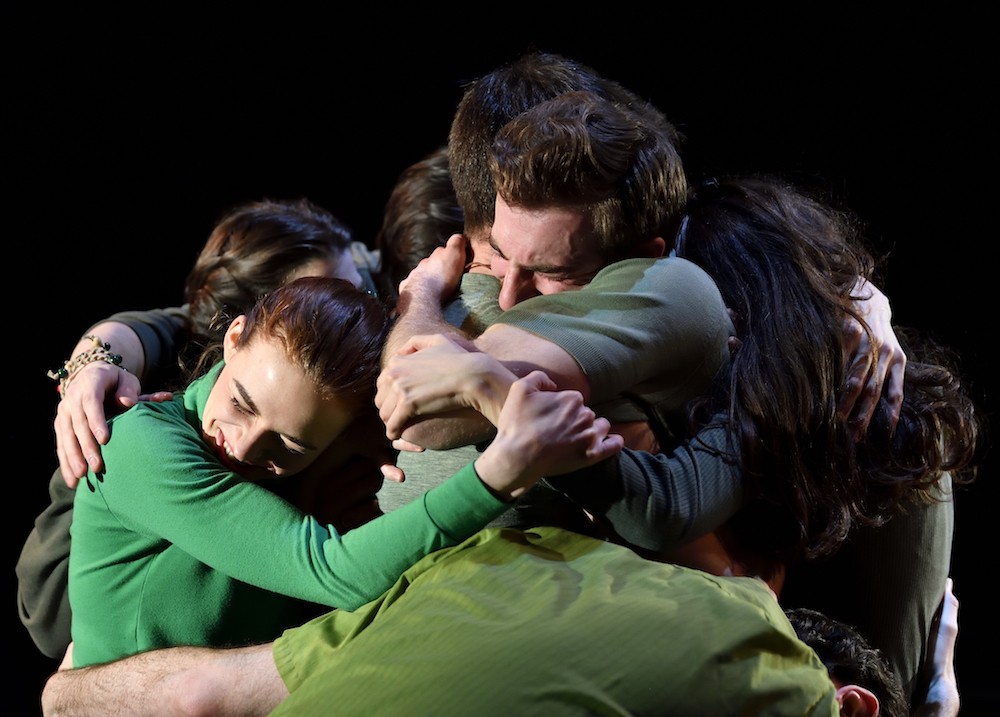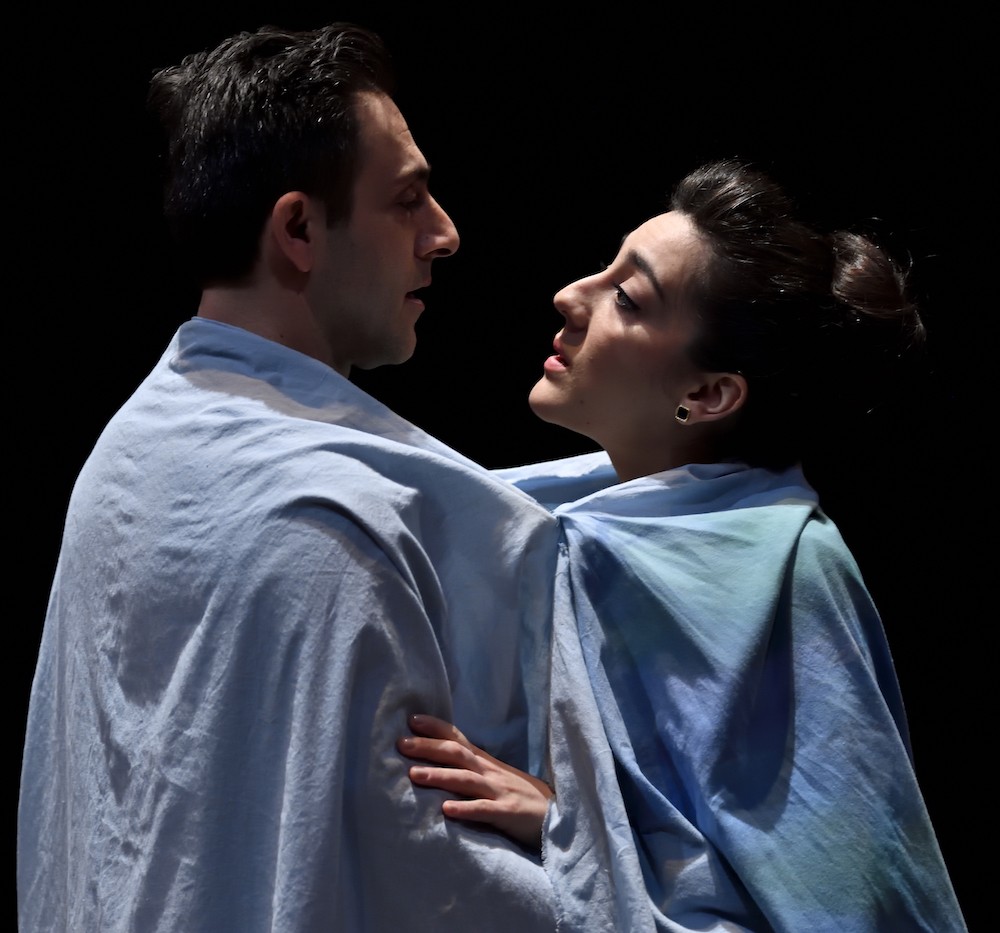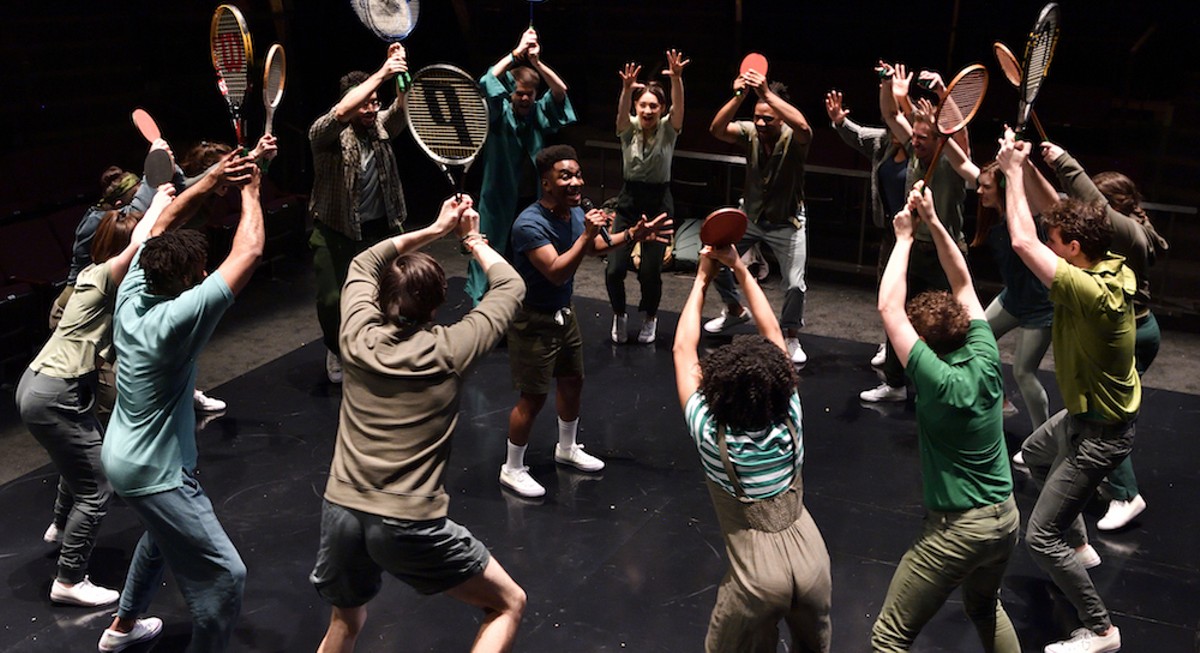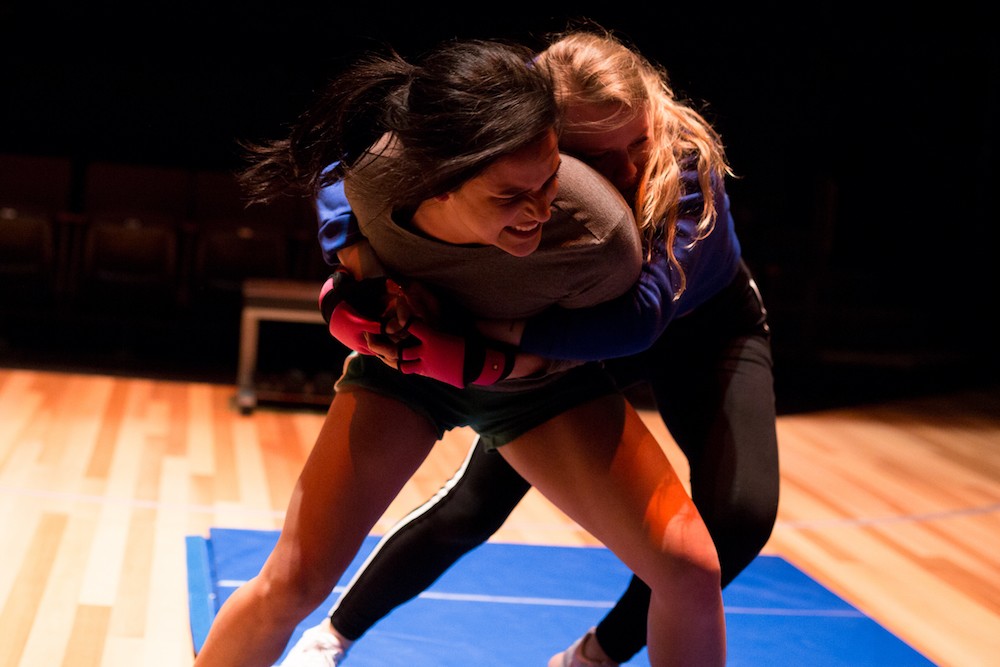The youth arts journalism program, Arts Bureau Edge, took on its most ambitious project in its 10-month existence — covering Actors Theatre of Louisville’s 43rd Humana Festival of New American Plays.
Five students from duPont Manual High School, Floyd Central High School and Pleasant Ridge High School were up to learn and write about this prominent annual event that has helped keep Louisville in the national limelight.
Since late February, they have attended plays from the festival, organized with Actors Theatre’s assistance, specifically staff members Elizabeth Greenfield and Laura Mullaney. The sessions included members of the Professional Training Company, actors, dramaturgs, designers and others from the theater.
Arts Bureau Edge even brought together a panel of local playwrights to talk about the festival’s influence on the region, and how they got started and keep working as playwrights. (So, thank you, Steve Moulds, Larry Muhammad and Doug Schutte.)
Through it all, Melissa Chipman and I worked to help the participants choose their article ideas, research their stories, identify sources and, finally, organize their final pieces.
Chipman, who covered the Humana Festival for four years while a reporter at Insider Louisville, is longtime theater connoisseur and educator. She made a conscientious mentor with passion for the discussions the plays presented sparked.
While I covered the festival during my seven-year stint as the Courier Journal’s arts writer and in years before that as WFPL’s arts and humanities reporter, this experience was richer in another way. Here I was working with a team to teach arts journalism and introduce this festival to a younger generation.
Also, special thanks to Keith Stone and Scott Recker of LEO, who practice the values of collaborative journalism and bring you the articles our reporters wrote.
— Elizabeth Kramer, founder, Arts Bureau Edge, @arts_bureau
One stage works to support a variety of worlds during Actors Theatre’s Humana Festival By Audrey Boyd Floyd Central High School, sophomore Most of the productions in this year’s Humana Festival of New American Plays are in Actors Theatre of Louisville's Bingham Theatre, an the environment that can cause viewers to shift previously-held expectations because its architecture strays from the classic stage-right and stage-left experience.
The room holds a more arena-esque feel — with stacked seating of up to 331 people surrounding the four sides of the lowered stage.
During the festival, a glowing rocket ship appears in “We’ve Come to Believe.” A mausoleum takes center stage in the serious play titled “The Corpse Washer.” And in “How to Defend Yourself,” the stage becomes a gym that is at times transformed via multicolored light into a dance floor. All are vibrant and unique in their displays.
The transformations from one storytelling set to the next are ensured under the supervision of Actors Theatre’s Associate Technical Director Braden Blauser.
Blauser said this unconventional set design can be a challenge for new designers. For the festival, Actors Theatre has one designer to create the sets. Blauser said this helps all production in the festival have coordinated designs so the small details with set-changes and other technical aspects run more smoothly.
Whereas most plays in traditional theaters have 2-D set pieces and curtains as backdrops, these do not: The staff must determine a way to create a convincing environment without obscuring the view of the stage. They have to use minimal pieces to set the scene.
The Bingham Theatre can host multiple productions in a single day during the Humana Festival, with as little as an hour between each show to completely reinvent the stage. Blauser said a team of six carpenters floods the area as soon as the house clears to tear off and replace the flooring. He oversees the entire process, keeping the machine well oiled with every passing week.
There are some challenges to this theater-in-the-round. Actors often begin their lines facing one direction of the stage, but then finish in another to spread out a collective experience more evenly.
Still, performers and audiences can experience intimacy in the setting of the Bingham Theatre and during the Humana Festival; they get this while watching new works.

Humana Festival’s College Days’ weekend offers students ideas for ways into arts career By Debra Murray Pleasant Ridge High School, junior Imagine this: Just weeks ago, you were one of the 366 college students attending College Days weekend at Actors Theatre of Louisville’s Humana Festival for New American Plays — a weekend for students to learn about working in theater and see all the new plays that are part of the festival.
After arriving on Friday, March 22, you were among the many who filtered in for a breakfast Saturday morning to mingle before sessions. You had coffee in one hand, a legal pad in the other and high aspirations to succeed in a theater-related career.
For the past 14 years, the Humana Festival has dedicated a weekend to college students. During this weekend, participants got advice from a panel of professionals working in Actors Theatre’s Professional Training Company who talked about balancing several careers in “I Want It All: One Career Path Isn’t Enough.”
They listened to a talk “Hungry Never Starving: Strategies on How to Maneuver and Sustain a Life in the Performing Arts” by playwright Idris Goodwin, who also is StageOne Family Theatre’s producing artistic director.
Makayla Smith, a sophomore at Ohio’s Malone University, was one of the hundreds of students at College Days. Smith attended the panel and Goodwin’s talk.
“I’m personally loving this experience, getting to see brand new works and meeting new people with the same interests that I have. It’s been very stimulating,” Smith said. “It’s very encouraging [to see the apprentices], and it’s so cool to see people so passionate. They’re working. They’re thriving in the fields that they’re in. It’s really nice to know that you can go into the arts and be successful.”
College Days is a opportunity for college students to make relationships with students who share similar interests and to see what being a PTC apprentice is like. It gives students an idea of what being in theater is like and opens their eyes to other careers they weren’t aware of.
Smith said “The Corpse Washer” stood out for her. The play, set in Baghdad, focuses on a young man who wants to become an artist, but his father wants him to be a corpse washer, like himself and his forefathers. Smith said she was most moved during the scene when Jawad becomes a corpse washer like his father.
Many theater students are not sure of their plans after college, but some during College Days find their next career step in Actors Theatre’s Professional Training Company. The company gives apprentices with experience help that can further their careers. Most work in acting, while others work in costumes, directing and other areas.
During a season, the company mounts its own plays as well as assists with Actors Theatre’s regular season productions. During this year’s Humana Festival, the company performed the play “We’ve Come to Believe.”
“I think it’s exciting and also daunting because you see their skill level we’re at a really high bar at the Actors Theatre, but it’s inspiring to what the next step could be,“ said Kayleigh Howland, an Indiana State University undergraduate student.
During this year’s College Day’s weekend, 89 people auditioned for the company. The auditions, an annual event during these weekends, were overseen this year by Actors Theatre Professional Training Company Director Christine Albright-Tufts.
“What I love most about this job is being around potential,” she said, “and then I’m at this weekend where there are hundreds and hundreds of people who could potentially be a part of this organization in some way at some point and so to get to meet them was thrilling.”
Two current Professional Training Company members who auditioned during last year’s College Days weekend are Brent Schultz and Reagan Stovenour. Schultz said he came in without that much information.
“I never knew that regional theatre is killing it,” said Brent Schultz, Professional Training Company acting apprentice who purchased the last College Days package available.
Schultz had learned that places such as New York and Chicago weren’t the only places where theater was a thriving business, and learned about the Humana Festival.
“This is some of the best theatre I’ve ever seen in my life,” Schultz recalled thinking.
Like Schultz, many students don’t know about Actors Theatre’s thriving history, but after attending the theater during College Days, they get to see what Actors Theatre is really like.
Stovenour came in 2017 and saw the Professional Training Company perform “The Many Deaths of Nathan Stubblefield.”
“It was the most insane thing I had ever seen. It was wild and was such an incredible ensemble experience. I was like ‘this is what I want to do,’” she said.
The theater, said Albright-Tufts, later holds auditions in different cities and at colleges. After auditioning, a person could be asked to apply and then be interviewed. Then, the selection process begins. Albright-Tufts said there is no particular pattern to figuring out who is chosen. She added that she always looks for potential and believes that, while some may not be ready for the company now, in a year or two they could be the perfect fit.
Albright-Tufts’ outlook proves that artists can better orient their careers if they take the advice of some of the speakers on hand during College Days’ weekend. If it’s not quite your time just yet, always be working in other areas and towards your next step. You don’t have to be a starving artist, but as Idris Goodwin advised, “Stay hungry, my friends.”

‘Corpse Washer’ reflects a partnership of poetic writers By Cole Tanner Floyd Central High School, senior “I don't think I could write with just anybody. Sim has a brilliant mind, an informed mind, and a poetic mind,” said Naomi Wallace of Ismail Khalidi, who cowriter on “The Corpse Washer,” a play in this year’s Humana Festival of New American Plays at Actors Theatre of Louisville.
Wallace had five plays produced for the Humana Festival between 1996 and 2009. By working on this play with Khalidi, whom she calls Sim, she has found a true partnership.
Wallace’s use of “poetic, highly-original language” in her own work was cited when she was named a MacArthur Fellow in 1999.
The play “The Corpse Washer,” adapted from a 2013 novel of the same name by Sinan Antoon, follows the life story of Jawad, who wants not to follow in his father’s footsteps running their family washhouse. Rather, he wants to forge his own path as a sculptor.
“We committed to staying close to the spirit of the novel,” Wallace said, “while giving ourselves the freedom to re-imagine Jawad’s story for the stage.”
It is a very personal story. Jawad never leaves the stage during the nearly two-hour performance. Everything seen is filtered for the audience through the eyes of this one man as he matures and becomes wiser. He is haunted by the people of his past, to the point where they affect his decisions of the present.
The story seems a logical choice for the poetic and sociopolitical writing team.
Wallace recalled sharing the first draft with Antoon.
“He approved, and he even said he liked the humor in our play, which he felt was lacking in his novel,” she said.
He also welcomed the idea of adapting his novel to the stage and generally kept out of the process, trusting what Wallace and Khalidi were doing with the story.
Wallace described writing the play of “The Corpse Washer” as an attempt to create characters that are rarely seen on stage in our society.
“What about the children of Iraq, who are actually under the bombs?” she asked.
The writers wanted to make a story about truly human characters — about love and growing up, and humor amidst the dark times.
“Sim and I did our best to demonstrate the importance of humor in these same difficult circumstances,” she said.
In desperate times, Holding on to certain small things can matter and comfort.
The play’s minimalist set design by Kimie Nishikawa helps demonstrate this further. Largely consisting of drab grays and brown to portray the ravaged Iraq as a result of decades of war, certain scenes bring with them levity through creative use of a colorful props or costumes by designer Dina Abd El-Aziz.
“The Corpse Washer” marks an ongoing partnership for Wallace and Khalidi, who also cowrote “Returning to Haifa,” which premiered last year in London, and edited the 2015 collection “Inside/Outside: Six Plays from Palestine and the Diaspora.” Given their history and results of “The Corpse Washer,” one imagines their partnership will continue.
Actors Theatre’s Humana Festival reveals the art of dramaturgy By Gracie Vanover Floyd Central High School, junior The director yells it’s time for rehearsal to start, so the actors gather and get into their positions. The lights dim and the run-through begins. While the scene starts, the dramaturg sits to the side, smiling at the hard work they put in to perfect the show.
“With being a dramaturg, you essentially help develop a show using research, artistic and administrative skills,” said Alonna Ray, who works as a dramaturg with Actors Theatre of Louisville’s Professional Training Company.
Ray is part of the company of apprentices who work alongside professionals each year. She also works with theater’s Literary Department of four dramaturgs.
During this 43rd Humana Festival of New American Plays, which premiered five productions, including “The Corpse” Washer and “How to Defend Yourself,” the dramaturgs had a lot of subjects to research about each play — history, language and character backgrounds. Dramuturgs created packets of information to help actors and the production team.
“As dramaturgs, we guide the writers and actors in production,” said Jessica Reese, a dramaturg in Actors Theatre’s Literary Department. “We help strengthen their toolset and immerse themselves in the shows.”
Being a dramaturg means your responsibility is to help playwrights improve their scripts, help actors understand the pieces better and much more.
Daily tasks differ depending on where the show is in production. In early stages, jobs range from reading scripts to moving them forward to become possible productions. In later stages, like before the show opens, dramaturgs sit in on table reads, informing the cast and crew of their new findings in researching specifics for the show.
“In working on these shows, I help connect actors with different materials so they can connect better to the character they’re portraying,” said Ray.
Reese said she and her colleagues try to include the apprentices, like Ray, when they can.
“We want to give them experience through a routine and letting them sit in and participate often,” she said.
These opportunities help these young dramaturgs excel later in their careers. Ray said the commitment and experience from Actors Theatre helps push her in the right direction. By including them in the read together process and run-throughs, the apprentices learn from their guides.
“I’ve learned a lot of things since I moved here from Texas,” Ray said. “People like Hannah (Rae Montgomery, resident dramaturg) have helped point me in the right direction in helping these productions.”
The Humana Foundation has helped fund The Humana Festival since 1976. In these 43 years of the Humana Festival, thousands of apprentices have been helped to make their careers thriving ones. With helping the youth of the theater business, they are keeping theater and the passion for it alive.
Actress as an Athlete: The empowerment of female physicality in theatre By Annie Whaley duPont Manual High School, sophomore After a young college woman is brutally raped, her sorority sister, Brandi, creates a self-defense class where four other women band together to learn how to fight back.
This provocative play from the mind of Lily Padilla tackles topics such as how women cope in a world where they feel they are a body that can be attacked anytime. “How To Defend Yourself” in the 43rd Annual Humana Festival of New American Plays uses movement and physicality to highlight the sheer power of young women, especially when faced with the threat of sexual assault and rape.
“A lot of plays are people sitting down talking. Adding fights and other movements gives us another tool in the toolbox to tell stories,” said Jessica Reese, the dramaturg on “How to Defend Yourself” and self-proclaimed “sounding board” for the playwright.
Valuing the actress as an athlete opens new doors of how women are portrayed in theater. Historically, many women have been portrayed as dainty and fragile — the traditional damsel in distress archetype.
More recently, audiences have craved strong female characters. But the term strong female character can be a trap. We see traditionally masculine characteristics as strong and perceive traditionally girly things as weak. “How to Defend Yourself” highlights the power in femininity and gender expression.
“Brandi is the most physically capable person in that room,” said Anna Crivelli, the actress who played Brandi. “She’s the most physically dangerous and opposing. To play that and adopt that psychology was super empowering.”
Those who worked on the play valued the accuracy of not only the self-defense moves, but also the ways of talking about the concept of sexual assault and rape. The actors participated in a multilevel workshop that was about 90 minutes with some martial arts instructors which, according to Crevelli, created the “physical vocabulary” for the rest of the fights and allowed the actors to better understand each other’s bodies and strength levels.
The actors themselves had a lot of say in the choreography because it was actor-driven from the beginning, according to Crivelli. It allowed the actors to incorporate their certain skills into the piece.
“We have that beautiful jump sequence, that was super-dreamy for me to do because that is something that I feel completely qualified to teach or to act like I know about because I do. It starts with a little bit of laughter but by the time the music is cranked up, people are vibing with us. We have gotten applause after that, which nearly made me cry,” Crivelli said.
The “jump” sequence is the first time that all of the actors are truly connected and focused, moving in unison on stage. It’s one of the most powerful moments in the show.
Toward the beginning of the play, there is a call-and-response boxing sequence between Brandi and the other girls in the class. At first, the girls nonchalantly punch the air. But by the end, all of the women are striking the air with purpose and power. They are channeling their rage and desperation into the moves. The lighting casts a red glow on the screen and the speakers blare “Jump” by Rihanna. Seeing the physical capability and ferocity of women being celebrated on stage empowers the entire audience in an awe-inspiring moment.
Female fights aren’t widely portrayed as empowering. Instead, they are used as a form of comedy and are often catty.
That is not the case in “How to Defend Yourself,” and the climax of the play — a fight between two of the women Diana (Gabriela Ortega) and Kara (Abby Leigh Huffstetler). Huffstetler is fight certified and recognized as an actor combatant. Both Huffstetler and Ortega worked closely with the fight director, Drew Fracher, to make sure the fight was safe and visually theatrical for the audience, but also felt real and raw.
Throughout the play, the sheer rage the women felt was electric. Seeing the characters as strong role models who also were emotionally connected to their outrage, helplessness and vulnerability, represented well-rounded female characters we need to see more of in theater.







